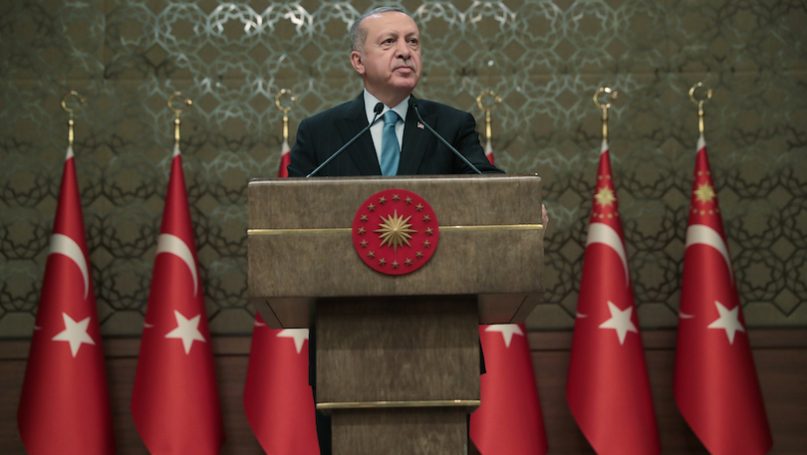
After the failed coup attempt in 2016, Turkish political sphere has been dominated by a series of emergency laws. It can be said that Turkey has been moving away from democratic discourses and practices in the last few years. This break from democracy has been stimulated by the dominant political and bureaucratic actors under the pioneering role of AK Party. This article is an attempt to provide a descriptive analysis of the problem of authoritarian slide under AK Party rule since the transition to presidential regime in 2018. This slide can be analyzed within the framework of Samuel Huntington’s conceptualization of “political decay”.
The AK Party was founded under the leadership of Recep Tayyip Erdoğan in 2001. Due to the insecure environment created by the 2001 economic crisis and the weak profile drawn by the current political actors AK Party got 34.28% of the votes in the 2002 elections and came out as the first political party. Since 2002, the AK Party has managed to stay in power alone, but it is known that AK Party faced a serious electoral challenge in the local elections in 2019. The Party lost the capital city Ankara Municipality and also failed to prevent main opposition party candidate Ekrem İmamoğlu’s election victory in Istanbul despite making the elections being held twice.
Huntington, in his 1968 book titled Political Order in Changing Societies emphasizes that the striking features of developing countries in the late 20th century are practices of violence, instability and political chaos. The basic assumption in Huntington’s ideas about political development is that political institutionalization is essential for stability and that stability (order) is a requirement for political development. Institutionalization can be defined as a tool through which structures and processes generate legitimacy for the political system. According to Huntington, most third world countries do not have full institutionalization and a legitimate political system as they are in the middle of the modernization process. Huntington uses the term “political decay” to describe the instability experienced by many newly-independent countries after World War II. The political institutions are governed by rules that ensure stability and predictability, but from time to time, political institutions fail to establish order and lack legitimacy due to the personal interests of the elites and conformism practices. This situation is described as “political decay”.
The current political system and ruling institutions pose challenges to democracy in Turkey. Elections are one of the indispensable elements of a democratic regime. However, what needs to be underlined here is that the elections should take place in a free and fair environment. It is important to state that the financial public resources must be fairly distributed among the political parties that compete in the elections. In addition, the mass media coverage of each political actor must be based on a fair understanding. For instance, Muharrem Ince, the main opposition Republican People’s Party’s candidate to challenge President Tayyip Erdogan in the June 24 2018 elections said a “media embargo” had been placed on opposition parties.
The role of independent and free media organs is essential for democratic regimes. According to data of the World Press Freedom Index 2020 Turkey is behind countries such as Cambodia and Algeria in media freedom and it ranks 154th out of 180 countries. It is also known that, detained journalists are denied any effective legal recourse and online censorship has reached unprecedented levels.
In democratic countries, one of the guarantees of civil liberties is the judiciary mechanism. In a country where the judiciary has become politicized, not only civil liberties get under threat but also democracy gets under threat. After Commissioner Dunja Mijatović and her team’s visit to Turkey from 1 to 5 July 2019, the Council of Europe published a report. According to the report published by Council of Europe there are rising concerns over the legacy of the emergency decrees in terms of access to justice and to an effective remedy, legal certainty and foreseeability.
Montesquieu defined the freedom of expression as the most important freedom. Silencing the opposing voices undermines democracy. Some specific groups have been stigmatized and even criminalized due to their opposing ideas against the government. For example in 2018, President Recep Tayyip Erdoğan dropped a complaint against four students he accused of “insulting the president” for holding up a satirical banner in a graduation ceremony. “‘Insulting the president’ should not be a crime”, said Benjamin Ward, Europe and Central Asia acting director at Human Rights Watch.
In a nutshell it can be said that the multi-party politics which started in 1950 was suspended in Turkey through military interventions in almost every decade. The “post-modern military intervention” in 1997 and the online memorandum issued by the Army in April 2007 reveal some of the anti-democratic practices that have been witnessed so far. However, Turkish democracy unfortunately preserves its fragility and unconsolidated structure. In 1999 after gaining official EU candidacy, the steps taken for the democratization of civil-military relations were not sufficient enough for democratic consolidation. What has happened in Turkey since 2018 can be seen as “political decay”. The political institutions established to meet the needs of certain conditions have been unable to adapt to changing conditions and they have ultimately lost their function and legitimacy.
Further Reading on E-International Relations
- Opinion – Turkey’s May Elections Are about Regime Change
- Opinion – How the West Can Prepare for a Post-Erdogan Era in Turkey
- Opinion – Disappointments and Expectations in Turkey
- Deciphering Erdoğan’s Foreign Policy after Turkey’s 2023 Elections
- Opinion – Türkiye’s 2024 Local Elections Challenge President Erdoğan
- An Ontological Reading of Turkey’s AK Party – Gülen Movement Conflict